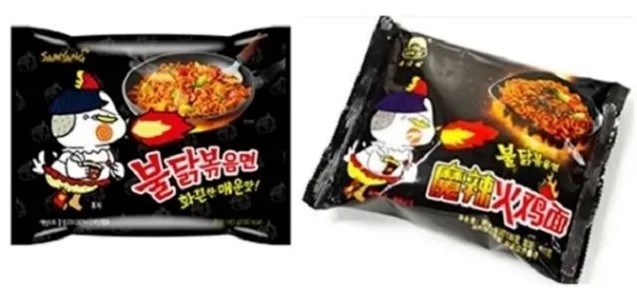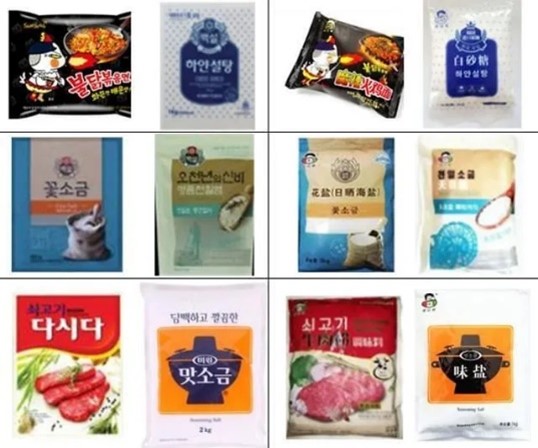A number of key South Korean food companies, including Samyang Food Co., CJ Cheiljedang Corp., Daesang Corp. and Ottogi Co., have formed a joint consultative body to file a lawsuit against two largest Korean food imitators, Qingdao Taeyangcho Food and Zhengdao Food Co., from China, on the grounds of imitating their products and violating intellectual property rights.
The consortium, which has acquired the assistance from the Korean IP Office and the Korea IP Protection Agency, claimed that the Chinese defendants have been producing and selling counterfeit products imitating their trademarks and packaging designs. The knockoffs look very similar or even nearly identical to the original Korean products. The products have been wildly sold online and offline across China. Many distributors even display both the original products and the knockoffs in the same area with the latter much cheaper than the former.

The comparison of the instant noodle products, photo from http://koreabizwire.com/
With the increasing popularity of the Korean food in China, there is a growing distribution of copycat products. There have been some individual administrative crackdowns or lawsuits involving Korean business owners and Chinese imitators, but this is the first time for the Korean companies to join forces to file a trademark lawsuit on IP rights violation.
According to a report issued by the Korea Herald, the number of cases of corporate trademark violation in China has increased by 350% from 2017 to 2021. Korean companies suffered about $27.8 million in damages due to the unauthorized use of trademarks or trademarks preemptively registered with bad faith by Chinese imitators. Customers easily get confused with those knockoff products, and the distribution of them could cause severe damage to these companies' images and reliabilities.
The industry experts believe that the joint lawsuit will not only raise the awareness and the IP value of Korean food products, but also send out a warning message to potential imitators in China.
Many international companies have encountered cases of malicious trademark squatting in China. While many of them have had invested lots of manpower and resources in fighting against those imitators or bad-faith registrations, some have unfortunately lost to their copycats. When foreign companies make plans to develop the Chinese market, it is extremely important to understand how IP assets are protected in China and register, manage and protected their trademarks properly.

Left: original products
Right: imitating products, photo by Korea Food Industry Association
The content of this article is intended to provide a general guide to the subject matter. Specialist advice should be sought about your specific circumstances.
Crystal Yulan Zhang
HFG Law & Intellectual Property
14/F, Huaqi Building no. 969
Wuding Road
Shanghai
200040
CHINA
Tel: 21 5 213 5500
Fax: 215 213 0895
E-mail: ovarlamova@hfgip.com
URL: www.hfgip.com
© Mondaq Ltd, 2022 - Tel. +44 (0)20 8544 8300 - http://www.mondaq.com, source Business Briefing




